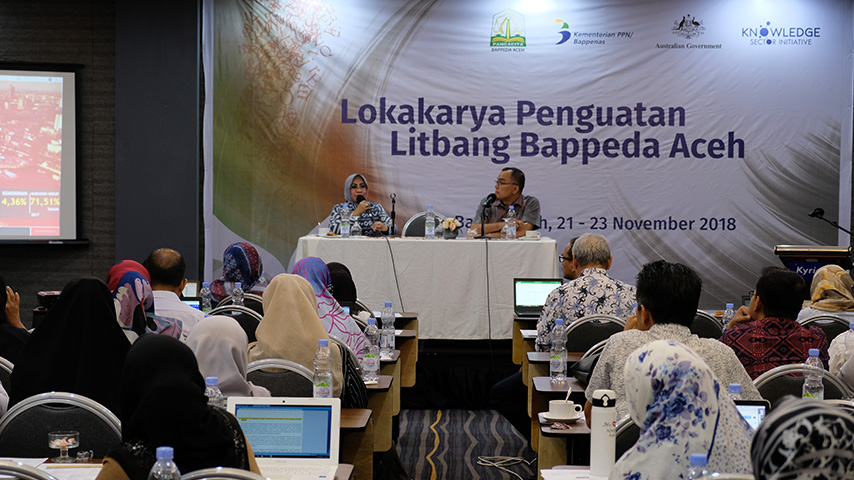BANDA ACEH - Strengthening the quality of research and development (R&D) for policy within government agencies is an important foundation for improving the quality of policy. To support this goal, the Aceh Provincial Government is revitalising its planning and R&D functions, based on evidence from the last ten years of Aceh’s implementation of special autonomy.
On 21-23 November, the Aceh Provincial Government - in collaboration with the Knowledge Sector Initiative (KSI) - held a workshop on Strengthening R&D within Aceh’s Regional Planning and Development Agency (Bappeda) in Banda Aceh. The workshop was attended by officials of the provincial and district/city Bappeda and the Aceh provincial government, as well as research institutes, universities and non-governmental institutions.
The workshop highlighted the importance of strengthening the foundations for evidence use in policymaking in Aceh. Key topics included standard operating procedures (SOPs) for Bappeda, the design of performance indicators, and a strategic policy research agenda for Aceh. "This research agenda will help us to prepare annual research plans for the next five years," said Secretary of Aceh’s Bappeda, Feriyana.
Feriyana said that improving the quality of policy has become an important focus for the current Provincial Government. This aims to ensure that development programs outlined in Aceh’s 2017-2022 Regional Medium Term Development Plan are more targeted, effective, efficient and sustainable. With Aceh’s special autonomy funds concluding in 2028, effective use of development funds is critical in helping to improve development outcomes in the province.
Feriyana acknowledged that improving the quality of policy was only possible through good planning processes, supported by strong R&D institutions. "R&D can make a major contribution to improving regional development outcomes. We need accurate data and strong evidence to inform policies. This workshop will help create momentum to support development policy and planning in Aceh,” she said.
KSI’s Senior Coordinator Budhi Bahroelim explained that the workshop was one of three joint Bappeda activities aimed to improve the quality of R&D in Aceh. "We have invited experienced speakers from Jakarta, Makassar and Bandung to share their knowledge and experience with stakeholders here in Aceh," said Budhi.
KSI and Aceh’s Bappeda will also run a training workshop for policy analysts, in collaboration with the National Institute of Public Administration and the BaKTI Foundation. The workshop will be open to policy analysts working within government agencies, as well as those working in universities, research institutes and non-government organisations.

New Momentum
The new Presidential Regulation (No. 16 of 2018) on Public Procurement of Goods and Services provided additional momentum for regional governments to commission policy research, Budhi said.
The regulation now allows government to procure goods and services more easily from non-government organisations, including research services, under a new category of self-managed procurement (Swakelola Tipe III).
"We hope that provincial and local government agencies in Aceh will take advantage of this regulation to commission research as well as working with universities, research institutes and non-government organisations to get input and feedback on their research plans,” added Budhi.
Nina Toyamah, a researcher at the SMERU Research Institute, said that research organisations such as SMERU were open to working with local governments, including Aceh, on policy research. For example, in a number of areas, including DKI Jakarta, Surakarta, Mataram, and Makassar, forums to share research results had been set up. SMERU had also involved the community in a research survey through a community-based monitoring system tool.
"The changes to the presidential regulation open up new opportunities for collaboration between governments, universities, research organisations and local community groups on policy research. "[The regulation] is a strong foundation for better and more mature research collaboration," said Nina.






